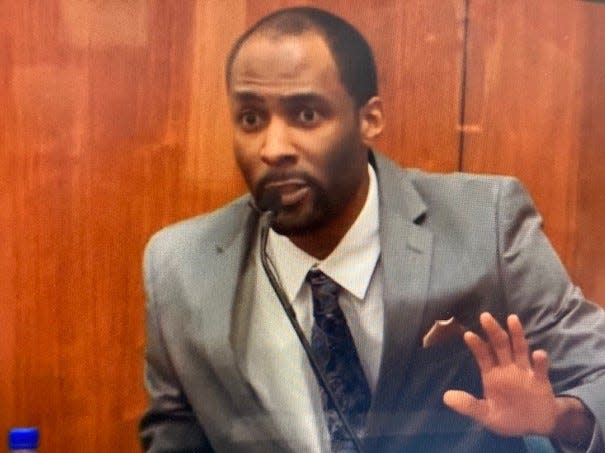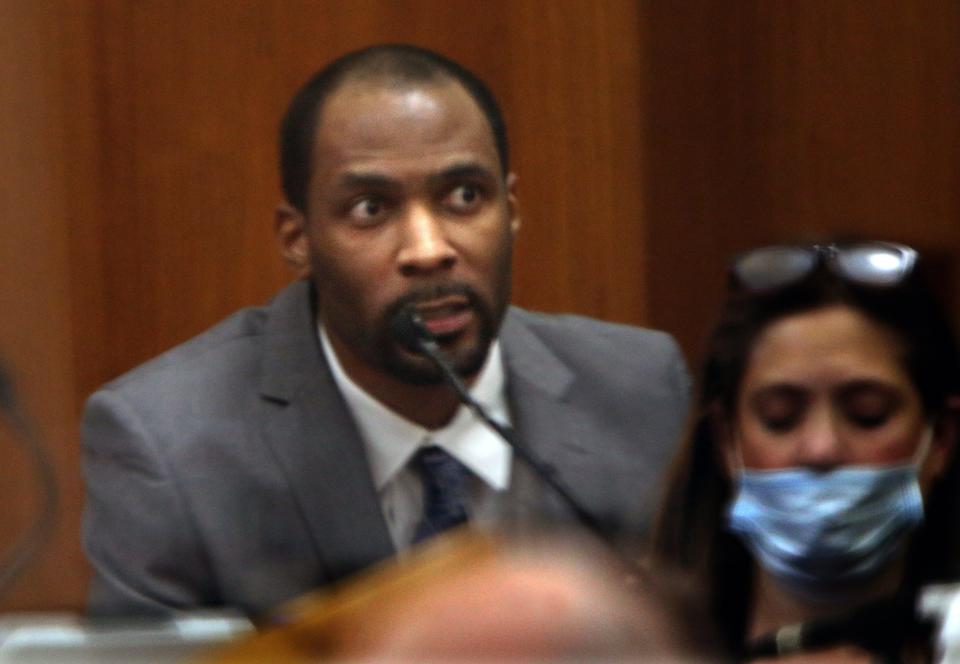Theodore Edgecomb makes self-defense claim at homicide trial, says he feared for his life

Theodore Edgecomb told jurors during his homicide trial Tuesday he didn't mean to shoot immigration lawyer Jason Cleereman and that his gun "just went off" during their confrontation.
Edgecomb said he'd been trying to escape from Cleereman and his wife, who he testified had hit him with her vehicle as he rode his bike a few minutes earlier on Brady Street. He also testified he thought they tried to deliberately run him down a second time.
Edgecomb, 32, has raised self-defense to a charge of first-degree intentional homicide in Cleereman's Sept. 22 shooting death. But his own testimony that he didn't intend to shoot made the prosecutor question whether the jury should even hear the instruction about self-defense, since the privilege applies to someone who intentionally uses force when he reasonably fears death or great bodily harm.
Judge David Borowski agreed he was very surprised by Edgecomb's testimony, but after his lawyers argued that enough evidence of self-defense was raised, the judge said he was inclined to give the instruction before the jury gets the case Wednesday.
Edgecomb began his roughly three hours of testimony Tuesday with an account of his first encounter with the couple that differed dramatically from that offered by Evangelina Cleereman. She testified last week Edgecomb darted out into Brady on his bike, causing her to swerve.

Edgecomb told jurors he was riding westbound on Brady when he heard a horn blare and looked back to see the Cleeremans' Kia Soul coming at him. He said he was struck and knocked onto a parked car. He said the horn was actually from an eastbound car the Kia had nearly hit before swerving back into his lane.
Edgecomb recalled someone in the vehicle hurling a racial slur laced with profanity at him.
More: Immigration lawyer's widow testifies at homicide trial of cyclist who shot husband near Brady Street
"I could have been killed," he said. "Then they insulted me. In my mind, I'm thinking maybe they're drunk. It was the only reason I could think of for someone throwing out an insult."
Edgecomb wasn't hurt, so he rode hard after the Kia and found it stopped for the light at Holton Street.
Jurors were repeatedly shown surveillance video of Edgecomb leaning into the passenger window, asking if Jason Cleereman had been talking to him. The footage also shows Edgecomb punching Cleereman in the face when Cleereman responds.
After that, Edgecomb testified, "I just wanted to be done with the altercation altogether," and rode off around the corner onto the bridge.
Things didn't end there.
Edgecomb testified he heard the Kia accelerate and squeal its tires and that he saw it speeding toward him. So he jumped the curb onto the sidewalk.
"Fear overcame me," he said. "They had no remorse the first time, and now they were deliberately and intentionally trying to hit me."
Edgecomb said he headed toward a set of stairs that led from the bridge. His hope was the car wouldn't follow him that far. He then noticed Cleereman walking quickly toward him. Cleereman, Edgecomb testified, appeared to be carrying something in his hand and said "I'm going to kill you now, (N-word)."
More: Self-defense cleared Kyle Rittenhouse; will it work for a Black man who shot a white lawyer?
He said he thought about jumping the railing, but the drop was too far. He said he considered taking the stairs but didn't want to turn his back to Cleereman. So he pulled his gun and held it at his waist. He put up his other hand and said "stop." He said he heard Evangelina Cleereman yell, "He's got a gun."
Jason Cleereman didn't stop; Edgecomb said the immigration lawyer lunged, like he was about to tackle him or grab his weapon. Edgecomb said he pulled back and the gun fired. Cleereman was hit in the face and died at the scene.
"I was definitely defending myself," Edgecomb said.
A good portion of his direct examination then focused on why Edgecomb fled the state and remained a fugitive until he was arrested after a traffic stop in Kentucky six months later.
Edgecomb said he feared no one would believe his story and that the justice system would not be fair to a Black man who had shot a white attorney.
He said he spent much of his time on the lam trying to contact family to help him raise money for lawyers. He said he threw the gun, which he said belonged to his fiancée, out the window somewhere in Illinois or Indiana as he drove south after the shooting.
"I didn't want to be caught with it and give police or anyone reason to kill me and say I was armed," he said.
Edgecomb also admitted to changing his appearance while he was wanted and giving the fake name Agoo Newman to the Kentucky state trooper who stopped him. He said at the time he did so because he hadn't yet secured lawyers for his plan to surrender voluntarily.
"I never intended to hurt, harm or endanger anyone," he said. "It was a tragedy. I just wish it would never have transpired."
Before getting into the meat of his testimony, Edgecomb said he has five children, studied psychology in college, but remains a few credits short of a bachelor's degree. He worked for a Waukesha transformer factory before the pandemic and started a nonprofit mentoring organization.
Borowski denied defense attorney B'Ivory LaMarr's request to introduce photos of Edgecomb with his children.
Edgecomb was calm and deliberate on direct examination, but on cross started out trying to answer almost every question with the response, "I reacted to protect myself from being harmed," and Borowski warned him to answer questions, not make speeches.
Assistant District Attorney Grant Huebner questioned Edgecomb repeatedly about his claim to have thrown the gun in some water near the Indiana border, when he could have gotten rid of it in Milwaukee.
"You ditched the gun because you knew it could tie you to the homicide, correct?" Huebner asked. Edgecomb asked him to explain "ditched," before ultimately answering the question.
On redirect, Edgecomb claimed to have learned about "imminent threats" during courses for concealed carry and while working for a security firm alongside federal agents checking docks.
Huebner then asked if he'd had training in shooting firearms. Edgecomb said yes. "And they teach you how to hit your target, right?" the prosecutor asked, before ending his questioning.
The jury will hear closing arguments on Wednesday morning and then begin deliberations.
Contact Bruce Vielmetti at (414) 224-2187 or bvielmetti@jrn.com. Follow him on Twitter at @ProofHearsay.
Our subscribers make this reporting possible. Please consider supporting local journalism by subscribing to the Journal Sentinel at jsonline.com/deal.
DOWNLOAD THE APP: Get the latest news, sports and more
This article originally appeared on Milwaukee Journal Sentinel: Bicyclist says gun 'went off' when he shot lawyer on Milwaukee bridge

